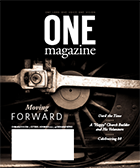
October-
November 2018
Moving Forward
------------------
|






Attract, Surprise, Inform
By Brenda Evans
I strummed my fingers on the oak table and waited for turnip greens and mashed potatoes. Bill had ordered his usual cornbread, meatloaf, and fried apples. We were seated next to a wall jammed with old ads: NuGrape, liver pills, fertilizer, and sheep-gut tennis racquets among others.
“Wrigley’s Spearmint. Remember that?” Bill said. I didn’t remember the ad, but I remembered the gum. I had chewed it.
The yellowed ad, probably from the 1940s, made big claims. Wrigley’s Spearmint was “the perfect gum” made from “real sap of real tropical fruit trees.” It went on for three paragraphs. Said it was good and good for you. It would harden your gums, preserve your teeth, soothe your throat, and sharpen your appetite.
I usually don’t pay much attention to ads. Except for Super Bowl ads, television ads give me time to make microwave popcorn, read a text, or play Words With Friends. Newspapers—the same. On Sunday, I want the half-inch stack of “news.” You keep the inch-high stack of ads.
But after the Wrigley’s Spearmint ad, I started to notice. A certain mattress system offered a “curated set of everything you need for deep, uninterrupted sleep.” Wow, a curated mattress. A renewal notice promised I can “rub shoulders with the world’s richest and most powerful” if I subscribe to their magazine. A red and blue mailing brought me an “exclusive event pass” to a health screening. A newspaper ad promised air duct cleaning for $35. Never knew.
But the clincher promised to get rid of my deep belly fat. It’s a “stunning technique…in high demand,” the ad said and offered a must-see video. A nearby photo showed a heaping teaspoon of grass-green mush—the stunning technique, I assumed. Maybe I’ll keep what I’ve got.
Since the Wrigley’s and mashed potatoes day, I’ve read dozens of print ads. The world’s finest eye cream, how to publish a book, and sure remedies for burning foot and sciatica pain. I learned how to buy a 4-in-1 screwdriver, take a cruise, increase my mate’s affection, own government-issued American Eagle Gold Coins, buy a horizonal-shaft gas engine, and other less essential items.
Television, movie, social media, and web ads make many promises. Radio ads, email, Christian magazines, and church bulletins give me additional options. The only ads I’ve turned deaf to are robocalls. Hang up. Click.
I also learned we are on the verge of a new wave of advertising methods: voice-assistant apps that “reach consumers who have an aversion to traditional ads,” Alexandra Bruell recently said in a Wall Street Journal article. Voice assistant devices give choices and save time. We the people prefer to select the ads we listen to and when. We want things that speed up our lives, says Gary Vaynerchuk, founder and CEO of VaynerMedia, and audio is faster than video.
I admit some ads have entertained me, too. The Amigos—Samuel Jackson, Spike Lee, and Charles Barkley—made me laugh out loud. “Where the deer and the cantaloupe play” was a hoot. I’m not sure I noticed the advertiser. I’ve seen gentle ads, as well, with good fathers and mothers and children. Usually they are light spoofs about home and family, kindness and consideration—and a product, of course. Ads can uplift and still sell.
These months have been a bombardment. The entire world seems interested in me. Advertisers have pushed and pulled, teased and pleased, and coaxed me to buy or sell or think or do what they want me to. That’s what makes a good ad, according to design consultant and typographer, Alex W. White. Successful ads attract, hold, make one point, and poke holes in our buying-resistant shells.
According to White, the best ads have a fresh delivery, unexpected message, and often a drama or “story” that pulls us in. Remember the puppy and Clydesdales a few Super Bowls ago? I liked their story, even though I didn’t like or buy their product. That’s a point Alex White makes. Great ads make us feel—maybe even think—and if we do either one, maybe we will buy. Ad-makers and sponsors count on it.
Mr. White also says that bad ads chase, harangue, or interrupt when they should encourage and attract, even be outrageous. By their nature, ads either entice us or fail.
I’m not ad-resistant. I’m seducible and know it. Most of us are. That’s why I make microwave popcorn during a TV break rather than watch ads. That’s also why I don’t troll the web, crawl the mall, or window shop. I call myself a “bad shopper” because I don’t always know where to find stuff when I really need it. If it’s women’s stuff, I ask friends. They know, and they’re nice enough to tell me.
I can’t condemn advertising or advertisers carte blanche, as the British historian, Arnold J. Toynbee, did more than 50 years ago when he called the business “an instrument of moral, as well as, intellectual, miseducation.” And criticism is not my purpose either.
In fact, ads can serve good purposes. Consider charitable organizations and denominational agencies. We need to know who they are, what they are about, their needs, and how to support them. They must advertise.
Plus, there are everyday issues. If I need printer ink or a garden hose, Bill watches newspaper flyers. He is an ad-reader, but doesn’t let ads turn his wants into needs. By needs, I mean must-haves, like air, food, water, and other essentials for living. Wants aren’t must-haves. They are hankerings. Ads give me hankerings. I want a new car, but don’t need it. A used one will do just fine—or, better yet, I can repair the old one. For some of us, ads change our wants into needs, or so we think.
Personally, what I have to do is stand guard over what I see, hear, and think when it comes to ads. It’s mindfulness, being aware and alert in the present moment, so I know the difference between what I need and what I want. New Testament writers, plus Jesus, all warned I can be enticed. Solomon said it, too. Read Ecclesiastes and look for his shrewd advice to watch out. He knows. His is a sad story. With David, I’ve learned to pray, “O Lord…give me an undivided heart” (Psalm 86:11).
Volkswagen’s Think Small ads were everywhere in the early 1960s. They were really good: clever, persuasive, fun. The best ads usually are. Maybe that’s what got us. I don’t know. By 1964 we had bought a brand new anthracite gray Beetle. Back then it was a funny looking vehicle with the motor in the back and a rear-wheel drive good on Northern New Hampshire snow. Nothing stopped us, from a foot of snow to the giant frost heaves that rocked and bounced us to the roof of our Bug.
I don’t know whether ads beat us into submission or seduced us. I just know we bought a Beetle for $1,600 and paid $49 a month until it was paid off. We weren’t tricked into trading away our blue and white 1955 Straight-6 Chevy for a four-cylinder, low-slung insect. I reckon something bit us, gave us car-buying fever. For whatever reason, we plunged into Beetle-dom. Since then, we have taken other plunges.
Here at the end, I don’t want to sermonize, but I will remind. Paul warned us to watch out for words that beguile, entice, and delude (Colossians 2:4). Not that he’s talking about ads, of course, but the principle is there: words are powerful. We must stay alert, not be tricked or enchanted, whatever the issue is. Vision is powerful, too. Eve bit into the wrong fruit because it was “pleasant to look at,” a delight to her eyes. Be careful about what
you swallow.
O, Father, help us stand guard over our eyes, our ears, our mouths, our minds. Help us stay wise. Help us think, feel, and choose righteously. Help us keep our hearts with all diligence, O Lord (Proverbs 4:23).
About the Writer: Brenda Evans is a retired English teacher. She and her husband Bill (former director of Free Will Baptist Foundation) live in Cattletsburg, Kentucky. They are proud grandparents of seven.
|
|

